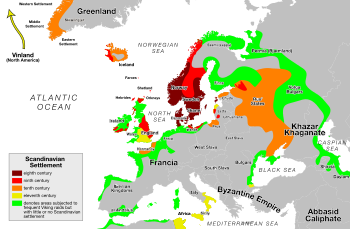
Back شماليون Arabic Nòrdics Catalan Seveřané Czech Nordboere Danish Norsemen English Normanoj Esperanto Pueblos nórdicos Spanish نورسها Persian Lochlannach Scots/Gaelic נורדים HE
«Sappiamo che vengono ricordati nelle fonti con nomi diversi quali Norreni, Vichinghi, Variaghi e Normanni, tutti appellativi riconducibili a guerrieri temibili e abili marinai originari delle remote regioni scandinave. Questi, infatti, salparono dalla Norvegia, Svezia e Danimarca...»

I norrèni[2] o nordici[3] sono un gruppo etnolinguistico di popoli germanici che nel Medioevo abitavano la Scandinavia e parlavano la lingua norrena[1][4][5][6], lingua del ramo germanico settentrionale da cui discesero le moderne lingue scandinave[7][8].
Il termine 'norreni' è spesso assimilato al termine vichinghi[9], sebbene quest'ultimo termine sarebbe specifico per quel ristretto gruppo di norreni esploratori e guerrieri che a bordo di dreki navigavano per mare e compivano scorrerie[10].
Il termine norreno era tradizionalmente utilizzato per riferirsi solo alla lingua norrena e alla letteratura norrena proprie della Norvegia e Islanda del IX-XIV secolo[11][12][13], mentre il suo utilizzo per indicare i popoli nordici è un'estensione recente.
- ^ a b Lorena Cannizzaro, Introduzione all'archeologia scandinava, su archeofriuli.it, Società friulana di archeologia, 23 maggio 2020.«Sappiamo che vengono ricordati nelle fonti con nomi diversi quali Norreni, Vichinghi, Variaghi e Normanni, tutti appellativi riconducibili a guerrieri temibili e abili marinai originari delle remote regioni scandinave. Questi, infatti, salparono dalla Norvegia, Svezia e Danimarca»
- ^ norreno, in Treccani.it – Vocabolario Treccani on line, Roma, Istituto dell'Enciclopedia Italiana.
- ^ nòrdico, in Treccani.it – Vocabolario Treccani on line, Roma, Istituto dell'Enciclopedia Italiana.
- ^ Simone Barcelli, Il Retaggio Perduto dei Vichinghi: Quando i Norreni conquistarono il mondo, Cerchio della luna, 2019, ISBN 9788869375019.«In Inghilterra venivano anche chiamati uomini del Nord o norreni, termini con cui all'epoca si indicavano in maniera generica tutte quelle popolazioni che provenivano dalla Scandinavia, senza distinzione per regione...»
- ^ Rory McTurk, A Companion to Old Norse-Icelandic Literature and Culture, John Wiley & Sons, 2008, p. 7, ISBN 978-1405137386.«Old Norse' defines the culture of Norway and Iceland during the Middle Ages. It is a somewhat illogical concept as it is largely synonymous with 'Norse'... The term 'Norse' is often used as a translation of norroenn. As such it applies to all the Germanic peoples of Scandinavia and their colonies in the British Isles and the North Atlantic.»
- ^ Jeremy DeAngelo, The North and the Depiction of the "Finnar" in the Icelandic Sagas, in Scandinavian Studies, vol. 82, n. 3, 2010, pp. 257–286, JSTOR 25769033.«The term "Norse" will be used as a catchall term for all North Germanic peoples in the sagas...»
- ^ David A. Leeming, The Handy Mythology Answer Book, Visible Ink Press, 2014, p. 143, ISBN 978-1578595211.«"Who were the Norse people? The term Norse is commonly applied to pre-Christian Northern Germanic peoples living in Scandinavia during the so-called Viking Age. Old Norse gradually developed into the North Germanic languages, including Icelandic, Danish, Norwegian, and Swedish»
- ^ Lorena Cannizzaro, Vichinghi misteriosi – ma senza esagerare, in Query. La scienza indaga i Mysteri, CICAP, 2021.«provenienti dai territori scandinavi di Danimarca, Norvegia e Svezia»
- ^ Christopher R. Fee, Mythology in the Middle Ages: Heroic Tales of Monsters, Magic, and Might, ABC-CLIO, 2011, p. 3, ISBN 978-0313027253.«"Viking" is a term used to describe a certain class of marauding Scandinavian warrior from the 8th through the 11th century. However, when discussing the entire culture of the Northern Germanic peoples of the early Middle Ages, and especially in terms of the languages and literatures of these peoples, it would be more accurate to use the term "Norse." Therefore during the Middle Ages and beyond, it therefore might be useful to speak of "German" peoples in middle Europe and of "Norse" peoples in Scandinavia and the North Atlantic.»
- ^ Viking, in Oxford learners dictionaries. URL consultato il 23 novembre 2021.
- ^ norrèno, in Treccani.it – Vocabolario Treccani on line, Roma, Istituto dell'Enciclopedia Italiana.
- ^ norreno, in Sapere.it, De Agostini.
- ^ norreno, su grandidizionari.it.